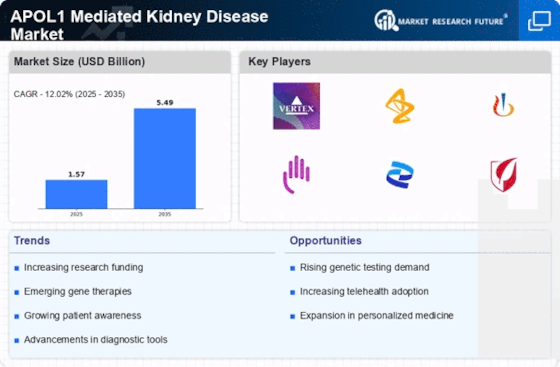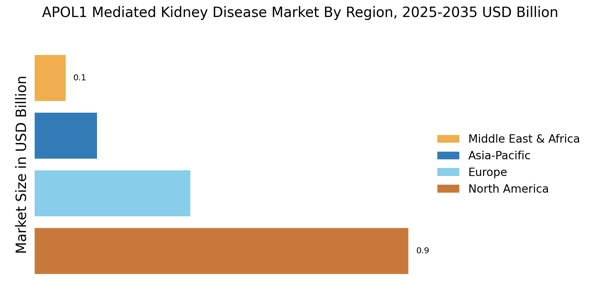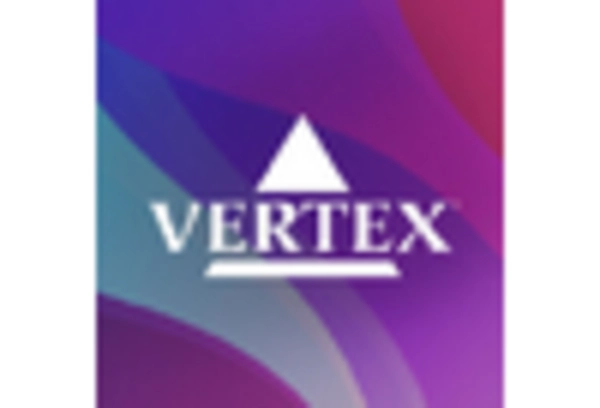Innovations in Gene Therapy
Innovations in gene therapy are poised to transform the APOL1 Mediated Kidney Disease Market. Recent advancements in CRISPR and other gene-editing technologies offer promising avenues for treating genetic disorders, including those linked to APOL1 variants. These therapies aim to correct or mitigate the effects of harmful gene mutations, potentially reducing the incidence of kidney disease among affected individuals. As clinical trials progress and regulatory approvals are sought, the market may witness a surge in investment and interest from pharmaceutical companies. The potential for gene therapy to provide long-term solutions could reshape treatment paradigms, making it a critical driver in the evolving landscape of kidney disease management.
Enhanced Awareness and Advocacy
Enhanced awareness and advocacy surrounding APOL1-mediated kidney diseases are driving growth in the APOL1 Mediated Kidney Disease Market. Patient advocacy groups and healthcare organizations are increasingly focused on educating both the public and healthcare professionals about the implications of APOL1 variants. This heightened awareness is likely to lead to earlier diagnosis and intervention, ultimately improving patient outcomes. Additionally, as more individuals become informed about their genetic risks, there may be a greater demand for genetic testing and personalized treatment options. This shift in patient engagement is expected to create new opportunities for market players to develop targeted therapies and educational resources that address the specific needs of this population.
Rising Prevalence of APOL1 Variants
The increasing prevalence of APOL1 gene variants among certain populations is a notable driver in the APOL1 Mediated Kidney Disease Market. Studies indicate that individuals of African descent exhibit a higher frequency of these variants, which are linked to a greater risk of kidney disease. This demographic trend suggests a growing patient population that may require targeted therapies and interventions. As awareness of APOL1-related kidney diseases rises, healthcare providers are likely to seek innovative solutions to address this urgent health issue. Consequently, the market for diagnostic tools and treatment options is expected to expand, reflecting the need for tailored healthcare strategies that cater to this specific genetic predisposition.
Regulatory Support for Precision Medicine
Regulatory support for precision medicine is emerging as a key driver in the APOL1 Mediated Kidney Disease Market. Governments and regulatory bodies are increasingly recognizing the importance of personalized approaches to healthcare, particularly in the context of genetic diseases. Initiatives aimed at streamlining the approval process for targeted therapies and diagnostics are likely to encourage innovation and investment in this sector. As regulations evolve to support the development of precision medicine, companies operating in the APOL1-mediated kidney disease space may find it easier to bring new products to market. This supportive regulatory environment could foster a more dynamic and responsive market, ultimately benefiting patients with APOL1-related kidney conditions.
Growing Investment in Research and Development
The growing investment in research and development within the APOL1 Mediated Kidney Disease Market is a significant catalyst for innovation. Increased funding from both public and private sectors is facilitating the exploration of new therapeutic approaches and diagnostic tools. This influx of capital is likely to accelerate the pace of clinical trials and the development of novel treatments tailored to APOL1-related conditions. Furthermore, collaborations between academic institutions and biotechnology firms are fostering a rich environment for scientific discovery. As a result, the market may experience a proliferation of new products and services aimed at addressing the unmet needs of patients suffering from APOL1-mediated kidney diseases.


















Leave a Comment